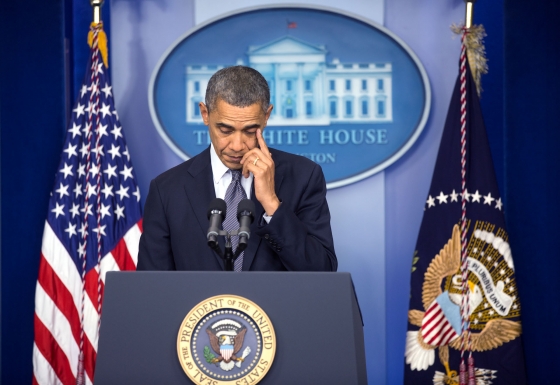A mass shooting at a college has brought media and political attention to the question of gun control. Does this sound familiar?
It should. Back in June, CBS News White House Correspondent Mark Knoller estimated that President Obama’s statement on the murder of nine people at Emanuel AME Church in Charleston, SC made it at least 14 times that the president had responded to a shooting. Sadly, his appearance last Thursday will likely not be the last time he will do so as president: there has been one mass shooting almost every day in the U.S. so far in 2015.
The country has seen so many acts of mass violence that the political response becomes almost formulaic. Leaders condemn the actions, the media reports details on the shooter despite pleas they not be publicized, a brief yet contentious public debate on reforming gun laws ensues, and in the end, nothing changes. Satirical paper The Onion has even taken to re-publishing the same article in the wake of mass shootings: “’No Way to Prevent This,’ Says Only Nation Where This Regularly Happens.”
In the face of constant and recurring tragedies, why has gun control remained an intractable issue? In the wake of the Sandy Hook massacre in 2012, some lawmakers – with public support from the White House – attempted to pass minor changes to gun laws. When that failed, they organized a bipartisan effort to allow for better enforcement of existing laws. This, too, went nowhere, even with widespread support among Americans for stronger enforcement measures.
After the Charleston massacre, South Carolina saw calls for stronger regulations on firearms win standing ovations in Columbia. Yet South Carolina Governor Nikki Haley and other key figures in state politics remained seated, illustrating to observers the unlikely prospects of new restrictions on firearms in the Palmetto State.
So what can Americans expect to see in the wake of the Oregon shooting? Probably nothing at the federal level. In fact, since Sandy Hook, support for gun rights has actually risen, according to a 2014 Pew study. The National Rifle Association (NRA), widely regarded as one of the most powerful lobbies in Washington, has recently been joined on its right flank by the even more strident Gun Owners of America.
It is interesting to note, however, that gun ownership is far more common among certain groups in American society. Southerners are nearly twice as likely to own guns as other Americans, and white men are more likely to own guns than both women and people of color. Yet, despite political and demographic divide on the subject, the same Gallup study found that party identification served as a weak predictor of gun ownership. Rather, authors of the study attributed this discrepancy in rates of gun ownership not to a Republican predisposition to own guns, but to the fact that more whites, Southerners, and married people identify as Republicans.
While somewhat counterintuitive, the notion that party ideology cannot explain everything relates to much of the gridlock on guns. It’s not as simple as Republicans blocking a Democratic agenda. Rather, many Democrats outside of the Northeast and West Coast with ties to gun-owning constituencies refrain from getting involved on an issue that’s a political no-win for them. Factor in a polarizing subject, powerful lobbying interest, and the simple fact that gun owners are more politically engaged, especially when it comes to (you guessed it) gun rights, the prospect of stricter gun control laws looks increasingly far-fetched.
Andrew Shell is Managing Editor at the Georgetown Public Policy Review and studying public policy at Georgetown University’s McCourt School. A Georgia native and 2010 graduate of the University of Georgia, he served in the Peace Corps in Ukraine for two years before moving to Washington, DC in 2013 where he currently resides.
